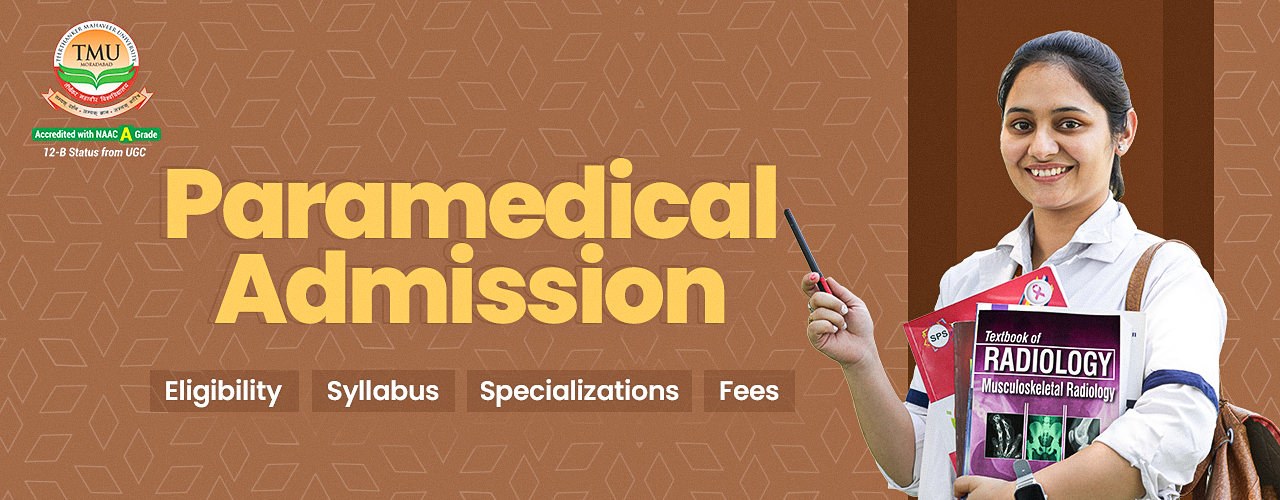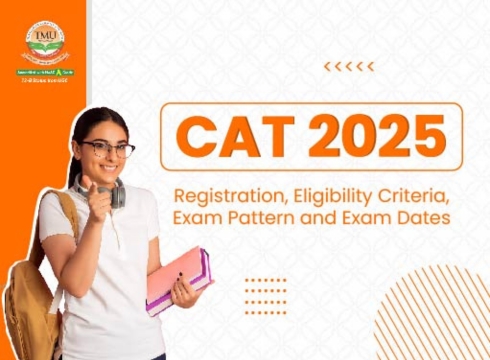Paramedical Admission: Eligibility, Syllabus, Specializations and Fees
Table of Contents
Paramedical courses are career-focused training programs designed to prepare students for essential roles in the healthcare sector, excluding that of a doctor. These programs emphasise technical expertise and supportive services in areas like diagnostics, therapy, and patient care. From operating advanced medical equipment to assisting in emergencies, paramedics form the backbone of an efficient healthcare system.
The hands-on training provided in these courses equips students with practical skills, ensuring they are job-ready in a relatively short time. Students seeking quality education and promising career prospects can explore various options through paramedical admission, which opens the door to a rewarding journey in healthcare.
Paramedical courses are specialized training programs that prepare students to work in the healthcare sector alongside doctors and nurses. For individuals interested in the medical industry but not interested in pursuing an MBBS, the paramedical courses are a great option because they provide excellent employment options in emergency services, diagnostic labs, and hospitals. The training in these courses is aimed at equipping students with practical skills, making them job-ready in a relatively short period.
A Diploma in Paramedical is a popular choice for students aiming to build a career in the healthcare sector without appearing for NEET. These courses are available in multiple specialisations such as radiology, physiotherapy, medical lab technology, emergency medical services, and more. Depending on the stream, the diploma in paramedical duration ranges from 6 months to 2 years and focuses on hands-on training to prepare students for real-world healthcare settings.
By pursuing a diploma in paramedical, students gain job-ready skills that open opportunities in hospitals, clinics, diagnostic labs, and emergency care facilities, ensuring a fast-track entry into the growing medical field.
As the healthcare industry continues to expand rapidly, the demand for skilled paramedical professionals is soaring. These courses offer not just quick employability but also stable income opportunities and the chance to make a real difference in people's lives.
Paramedical Courses Highlights
| Features | Details |
| Courses Level | Certificate, Diploma, UG and PG |
| Duration |
|
| Eligibility |
|
| Admission Process |
|
| Courses List | Medical Laboratory Technology, Radiology, Optometry, Dialysis Technology, Anaesthesia Technology, Clinical Research, etc. |
| Average Salary | INR 1.7 - 17 LPA (vary according to paramedical roles) |
Teerthanker Mahaveer University
Apply for Admission
Click Here To Apply for Admission
Importance of Paramedical Education in Healthcare
The importance of paramedical education in modern healthcare cannot be overstated. Paramedics play a vital role in emergency medical services, trauma care, diagnostics, rehabilitation, and even preventive care. Whether it's a lab technician identifying infections or an X-ray technologist diagnosing fractures, these professionals work behind the scenes to ensure accurate treatment decisions.
With healthcare systems becoming more sophisticated and technology-driven, there is an increased need for well-trained support staff. Paramedical courses fill this gap by offering specialised training that equips students with hands-on experience in their respective fields. As frontline healthcare workers, paramedics are often the first to respond during emergencies, especially in ambulances and trauma centres.
Their role became even more significant during the COVID-19 pandemic, highlighting the indispensable nature of these professionals in any healthcare ecosystem. With increasing hospital chains, diagnostic centres, and homecare services, this field is becoming one of the most stable and respected career paths in India and abroad.
Eligibility Criteria for Paramedical Admission
Academic Qualifications
The academic requirements for paramedical courses vary depending on the level of the course. For certificate and diploma courses, most institutions require candidates to have completed 10th or 12th grade from a recognised board, preferably with science subjects such as Physics, Chemistry, and Biology.
| Course Level | Minimum Educational Qualification |
| Certificate | 10th/12th (any stream or science) |
| Diploma | 10+2 (Science preferred) |
| UG (BSc, BPT, etc.) | 10+2 (PCB mandatory) |
| PG (MSc, MPT, etc.) | UG in a relevant field |
Some reputed institutions may have minimum percentage criteria ranging from 45% to 60%, depending on the specialisation. For instance, a Bachelor of Physiotherapy might require at least 50% in the 12th with PCB subjects.
Age Limit and Relaxation
Typically, the minimum age requirement for most paramedical courses is 17 years. While there's usually no upper age limit for certificate and diploma courses, some undergraduate and postgraduate programs may restrict it to 35 years. Certain institutions provide age relaxation to candidates from reserved categories (SC/ST/OBC) as per government norms.
Entrance Exams for Paramedical Courses
While many private and state-run institutions offer admission based on merit, some prestigious colleges and universities conduct entrance exams. Here are some common ones:
- AIIMS Paramedical Entrance
- NEET-UG(For Allied Health Sciences in some states)
- JIPMER Paramedical Entrance
- State-level entrance exams (like BCECE, KEAM, etc.)
| Entrance Exam | Description |
| AIIMS Paramedical Entrance | Conducted by the All India Institute of Medical Sciences (AIIMS) Delhi |
| NEET-UG (For Allied Health Sciences in some states) | Conducted by the National Testing Agency (NTA) |
| State-level entrance exams (like BCECE, KEAM, etc.) | Conducted by the respective state governments |
These exams generally test students on subjects like Biology, Chemistry, and Physics. Successfully passing these exams can provide access to top paramedical colleges that offer excellent placement opportunities.
Admission Process for Paramedical Courses
Steps Involved in the Admission Process
The admission process can be broadly divided into merit-based and entrance-based systems. Here’s how it usually works:
- Application Submission: Candidates need to apply either online or offline through the official college/university website.
- Merit/Entrance List: Based on academic scores or entrance test results.
- Counselling/Interview: For some UG and PG programs.
- Document Verification: Proof of qualification, identity, and eligibility.
- Admission Confirmation: After fee submission and seat allotment.
It’s crucial to keep track of important dates and deadlines to avoid missing out.
Documents Required for Admission
- Mark sheets (10th & 12th)
- Transfer and Conduct Certificate
- Passport-size photographs
- Identity Proof (Aadhar, Passport)
- Category Certificate (if applicable)
- Entrance Exam Scorecard (if applicable)
Having all these documents ready in both original and photocopy format can make the admission process smoother and faster.
Direct vs Entrance-Based Admission
In many private colleges, admissions are granted directly based on Class 12th marks. However, for government and top-tier institutions, entrance exams are often mandatory. Direct admission is quicker but may not offer the same level of academic recognition or placement support as competitive programs.
Paramedical Courses Top Colleges
| College | Location |
| All India Institute of Medical Sciences (AIIMS) Delhi | Delhi |
| Christian Medical College (CMC) | Vellore, Tamil Nadu |
| Postgraduate Institute of Medical Education and Research (PGIMER) | Chandigarh, |
| Jamia Hamdard College for Paramedical | Delhi |
| Teerthanker Mahaveer University (TMU) | Moradabad, Uttar Pradesh |
Types of Paramedical Courses
Certificate Courses
Certificate paramedical courses are short-term programs usually ranging from 6 months to 1 year. They are perfect for students who want quick entry into the healthcare industry without investing years in formal education.
Popular Courses Include:
- Certificate in Medical Laboratory Technology (CMLT)
- Certificate in Operation Theatre Technology
- Certificate in X-Ray Technology
- Certificate in ECG and CT Scan
These courses are mostly skill-oriented and often lead to immediate employment in clinics, diagnostic centers, and nursing homes.
Diploma Courses
Diploma paramedical courses are a step above certificate courses in both depth and duration. These typically span 1 to 2 years and focus on imparting both theoretical knowledge and practical skills. They are best suited for students who have completed their 10+2, preferably with science subjects.
Popular Diploma Courses:
- Diploma in Medical Laboratory Technology (DMLT)
- Diploma in Operation Theatre Technology (DOTT)
- Diploma in Radiology
- Diploma in Nursing Care Assistant
- Diploma in Physiotherapy
These courses are highly job-oriented and are in great demand, especially in diagnostic labs, private hospitals, and rural health centers. The advantage of pursuing a diploma is that it offers a strong foundation in the field without the lengthy commitment of a full undergraduate program. Plus, many students who start with a diploma can later upgrade their qualifications through lateral entry into degree programs.
Undergraduate Courses
Undergraduate paramedical programs generally span 3 to 4 years and are designed to provide in-depth academic and clinical training. These courses open doors to higher-level career opportunities and are often required for senior technician roles or specializations.
Top UG Paramedical Courses:
- Bachelor of Physiotherapy (BPT)
- B.Sc. in Medical Laboratory Technology (BMLT)
- B.Sc. in Radiology and Imaging Technology
- B.Sc. in Operation Theatre Technology
- B.Sc. in Optometry
- B.Sc. in Nursing
Eligibility typically includes a 10+2 qualification with Physics, Chemistry, and Biology as core subjects. These programs also include internship components, which help students gain hands-on experience in hospitals and labs. Upon graduation, students can either start working immediately or pursue higher studies in their respective fields.
Postgraduate Courses
PG paramedical courses are designed for students who wish to specialize further and aim for senior-level positions in the healthcare industry. These courses usually take 2 years and involve advanced academic modules, research projects, and in-depth clinical training.
Popular PG Courses Include:
- Master of Physiotherapy (MPT)
- M.Sc. in Medical Lab Technology
- M.Sc. in Radiology
- M.Sc. in Optometry
- M.Sc. in Operation Theatre Technology
These are ideal for candidates looking to enter teaching, research, or leadership roles in hospitals, academic institutions, or healthcare companies. Admission is generally based on performance in the relevant UG degree and sometimes includes entrance exams or interviews.
Paramedical Course Syllabus
Common Subjects Across Courses
Although syllabi vary based on the specific course and specialization, many paramedical programs share common foundational subjects. These subjects build a strong base in medical science and patient care.
Core Subjects Often Include:
- Human Anatomy & Physiology
- Pathology
- Biochemistry
- Microbiology
- Pharmacology
- Medical Ethics
- First Aid & Emergency Care
Understanding these core topics is crucial for any paramedical professional, as they are applicable across various specializations and work environments. Courses also emphasize communication skills, patient handling, and hygiene practices—important traits in any healthcare setting.
Course-wise Syllabus Breakdown
Let’s break it down with some examples:
| Course | Key Subjects |
| B.Sc. MLT | Clinical Biochemistry, Hematology, Immunology, Serology |
| BPT | Anatomy, Biomechanics, Electrotherapy, Exercise Therapy |
| B.Sc. Radiology | Radiation Physics, Imaging Techniques, Radiographic Positioning |
| B.Sc. Optometry | Visual Optics, Ocular Anatomy, Refraction Techniques |
Each course typically follows a semester-wise format, with increasing complexity in subjects as the course progresses. By the final year, students are often required to complete a project or clinical internship.
Practical and Clinical Training
Paramedical courses are highly practice-oriented. While classroom learning provides theoretical knowledge, the bulk of the course often involves practical lab work, clinical postings, and hospital internships. Students work with real patients under supervision, use advanced diagnostic equipment, and get a feel of real-time emergency handling.
Institutions usually partner with hospitals and diagnostic centers to provide internship opportunities, which are often mandatory for graduation. This hands-on training is vital—it boosts confidence and enhances employability.
Specializations in Paramedical Courses
Popular Specializations in the Paramedical Field
Paramedical courses offer a wide range of specializations tailored to meet the growing demands of the healthcare sector. Choosing the right specialization is crucial as it determines the career path and opportunities a student may encounter post-graduation.
Top Specializations Include:
- Medical Laboratory Technology (MLT): Focuses on analyzing body fluids and samples to assist in diagnosis.
- Radiology & Imaging Technology: Specializes in using imaging equipment like X-rays, MRIs, and CT scans.
- Operation Theatre Technology: Trains students in handling surgical instruments and assisting during surgeries.
- Physiotherapy: Deals with rehabilitation and physical recovery using manual therapy and exercises.
- Optometry: Involves diagnosing vision problems and prescribing corrective lenses.
- Nursing and Midwifery: Offers training in patient care, maternity, and emergency healthcare services.
- Dialysis Technology: Specializes in operating dialysis machines and managing patients with kidney disorders.
- Emergency Medical Technology: Equips professionals to handle trauma and emergency situations, often in ambulances or ERs.
Each of these specializations opens up job roles that are vital to the operation of healthcare systems. Some fields, like Radiology and Dialysis, are especially booming due to the rise in non-communicable diseases and lifestyle-related conditions.
Emerging and Niche Specializations
As healthcare technology evolves, new and niche specializations are emerging. These include:
- Perfusion Technology
- Audiology and Speech Therapy
- Medical Imaging Technology
- Rehabilitation Therapy
- Anesthesia Technology
These niche courses might require additional certifications or training but offer higher pay packages and unique job opportunities, particularly in metro cities and abroad.
Paramedical Course Fees Structure
Understanding the Cost of Education
The paramedical course fees vary significantly based on the course type, duration, institution, and location. Typically, government colleges offer more affordable fee structures compared to private institutions. While diploma and certificate courses may have lower costs, advanced degree programs often come with higher fees due to extended duration and specialized training.
| Course Type | Duration | Fee Range (INR) |
| Certificate | 6 months – 1 year | ₹10,000 – ₹50,000 |
| Diploma | 1 – 2 years | ₹20,000 – ₹1,50,000 |
| UG (B.Sc./BPT) | 3 – 4 years | ₹50,000 – ₹5,00,000 |
| PG (M.Sc./MPT) | 2 years | ₹70,000 – ₹4,00,000 |
Private colleges, especially those affiliated with large hospital chains, may charge higher fees but also offer better infrastructure, internship opportunities, and placement support.
Additional Costs and Scholarships
Students should budget for the following expenses in addition to tuition:
- Lab and practical fees
- Uniform and equipment costs
- Internship travel and accommodation
- Examination and registration fees
To support meritorious and economically weaker students, many colleges and governments offer scholarships. These are based on academic performance, entrance exam scores, or financial need.
Return on Investment (ROI)
Paramedical courses generally offer a high ROI. With starting salaries ranging from ₹15,000 to ₹40,000 per month (and increasing with experience), most students can recover their investment within a few years. Courses like Radiology, Physiotherapy, and Emergency Medical Services often lead to international opportunities as well.
Paramedical Course Fees at TMU
| Course | Specialization | Duration | Fees |
| Diploma |
| 2 years | Varies depending on the specialization, you may find out the same information on the university's website. |
| B.Sc. |
| 3 years & 6 months internship | Varies depending on the specialization, you may find out the same information on the university's website. |
| B.OPTM |
| 4 years | 34,200/sem |
| M.Sc. |
| 2 years | Varies depending on the specialization, you may find out the same information on the university's website. |
Career Opportunities After Paramedical Courses
Job Roles and Work Settings
- Graduates of paramedical courses can find employment in a wide range of sectors. These include:
- Hospitals and Clinics
- Diagnostic Labs and Imaging Centers
- Rehabilitation Centers
- Blood Banks and Pathology Labs
- Ambulance Services
- Government Health Departments
- Private Homecare Services
Common Job Roles Include:
- Lab Technician
- Radiology Technician
- Physiotherapist
- Emergency Medical Technician (EMT)
- Operation Theatre Assistant
- Dialysis Technician
- Optometrist
- Nursing Assistant
Each role requires a mix of technical knowledge, patient care, and communication skills. With experience, professionals can move into supervisory or administrative roles or even start their own diagnostic or physiotherapy centres.
Salary Expectations
Salaries vary depending on the specialisation, employer, and location
The Paramedical salary offered at entry-level positions ranges between INR 0.5 - 4 LPA, for mid-level profiles INR 4 - 6 LPA and senior-level profiles INR 6 - 7 LPA.
Salaries vary depending on the specialisation, employer, and location, below mentioned table presents the same:
| Job Role | Average Monthly Salary (INR) |
| Lab Technician | ₹15,000 – ₹30,000 |
| Radiology Technician | ₹20,000 – ₹40,000 |
| Physiotherapist | ₹25,000 – ₹50,000 |
| Dialysis Technician | ₹18,000 – ₹35,000 |
| OT Technician | ₹15,000 – ₹30,000 |
Professionals working in urban centers or with international certifications often earn higher salaries. Additionally, freelancing opportunities in physiotherapy or home healthcare are also on the rise.
Conclusion
If you are passionate about healthcare but not pursuing an MBBS, opting for admission in paramedical courses is a smart choice. These programmes cover critical areas like medical lab technology, radiology, physiotherapy, operation theatre technology, and more, preparing students for diverse roles in diagnosis, treatment, and patient care. With the rapid growth of the healthcare sector, the demand for skilled paramedical professionals is higher than ever. Institutions like Teerthanker Mahaveer University (TMU) provide hands-on training, modern labs, and industry exposure to ensure students are career-ready. Start your journey in healthcare with a paramedical course that promises both stability and growth.
Choosing the right specialization, understanding the course content, and selecting a reputed institution can make all the difference. Whether you're looking for a job in India or exploring options abroad, paramedical education lays a solid foundation for a rewarding career.
FAQs
Q1. Are paramedical courses better than MBBS for quick employment?
Ans: Yes, paramedical courses offer faster entry into the healthcare workforce and are ideal for students seeking quick employment opportunities.
Q2. Can I pursue paramedical courses without studying Biology?
Ans: Some certificate and diploma courses accept students from any stream, but most UG and PG courses require Biology in 10+2.
Q3. Which paramedical specialization has the highest salary?
Ans: Radiology, Physiotherapy, and Operation Theatre Technology typically offer higher salaries and growth opportunities.
Q4. Are paramedical courses recognized globally?
Ans: Yes, many paramedical qualifications are recognized abroad, especially with additional certifications or licensing exams.
Q5. Is NEET compulsory for paramedical courses?
Ans: NEET is not mandatory for most paramedical courses, though some institutes may require entrance exams for specific programs.
Q6. How to get admission in paramedical college?
Ans. Students generally need to have completed their 10+2 education with science subjects (Physics, Chemistry, and Biology) and meet the minimum eligibility criteria, which often includes a minimum percentage of marks in the 12th exams.
Q7. Is BSc better or Paramedical better?
Ans. Going for the BSc Paramedical programme will be a better decision for you if you wish to work in a hospital setting as a paramedical staff such as a nurse, operation theatre technologist, ultrasonography technologist, physiotherapist, etc.
Q8. Is Biology a required study in paramedical programmes?
Ans. Biology is essential for understanding medicine, as it applies biology to human disease. Medicine or paramedicine relies on biology. Candidates should avoid positions involving health or recovery from illness if they dislike biology. Those who don't understand the scientific rationale behind treatments should avoid fields that require responsibility for people's health or recovery.















